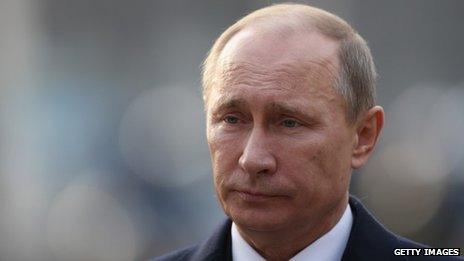Russian rouble hits new low against the dollar and euro
- Published

President Vladimir Putin has received permission to deploy Russian troops in Ukraine
Russia's rouble has fallen to a fresh all-time low against both the dollar and the euro after the political turmoil in Ukraine intensified.
The rouble fell 2.5% to 36.5 roubles against the dollar and 1.5% against the euro to 50.30.
Stocks on Moscow's MICEX main stock index also fell more than 11%.
The Russian Central Bank was reported to have sold up to $10bn (£6bn) of reserves to support the rouble, according to Reuters news agency.
The Russian Central Bank said last month that its international reserves totalled $493.4bn as of 21 February.
The sharp falls came as Russia's central bank hiked its key lending rate on Monday to 7% from 5.5%.
"The decision is directed at preventing risks to inflation and financial stability associated with the increased level of volatility in the financial markets," the central bank said in a statement.
Neil Shearing, chief emerging markets economist at Capital Economics, said the success of the central's banks moves would "depend largely on political rather than economic developments".
Economist Neil Shearing warns that Russia risks becoming the "sick man of Europe"
IMF starts loan talks
The dramatic market reaction came as the International Monetary Fund (IMF) said a team would arrive in Kiev on Tuesday to discuss conditions for urgent aid.
It said its "fact-finding mission" would discuss the reforms that would need to be in place before the fund could offer Ukraine financial support.
A European Commission spokesperson said a team of European experts was already in Kiev to assess matters.
"There are some difficulties in that country to which we have to respond through emergency measures in the economic field," said European Commission President Jose Barroso.
However, Reuters reported a European source saying no EU member would act on financial support for Kiev without the IMF assessment.
Selling 'fervour'
At the weekend, President Vladimir Putin received parliamentary approval to deploy Russian troops in Ukraine.
His spokesman said he had yet to decide whether he would send troops in.
"Now that (Russia and Ukraine) are actually on the verge of a military confrontation investors will start selling Russian stocks with special fervour," analysts at Rossiysky Capital said in a note for investors.
Artem Argetkin, trader at BCS in Moscow, said brokers were trying to close their positions at any price.
"There's a sell-off of everything right now," he added.
James Hughes, chief market analyst at Alpari UK, warned the sell-off would get worse.
"We can expect some very sharp moves in the ensuing couple of days as markets and world leaders look to establish just how much of a threat there is not only to stability in the area but stability across Europe."
Financial backing
Operators of privately run exchange booths in Russia said they were not prepared for the higher demand for the US dollar.
An employee at a small exchange said that her booth, which is open 24 hours a day, ran out of dollars by Sunday morning.
"We were not ready for this, we have not stocked up," she said.
Meanwhile, the G7 nations of Canada, France, Germany, Italy, Japan, the UK and the US said they were ready "to provide strong financial backing to Ukraine".
Ukraine needs an estimated $35bn (£20.9bn) over the next two years, according to its finance ministry,